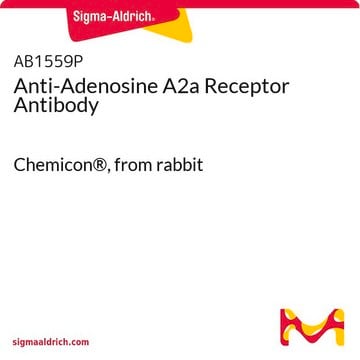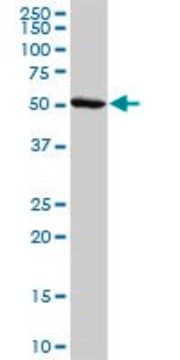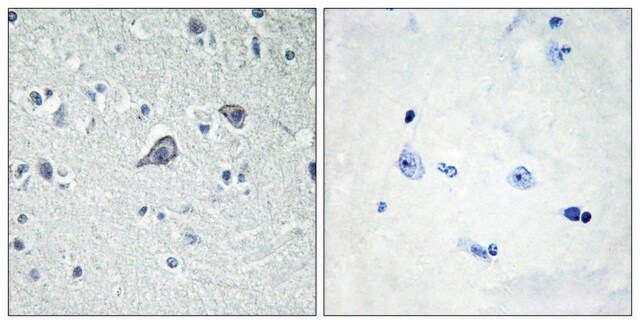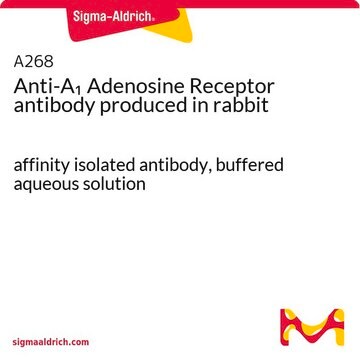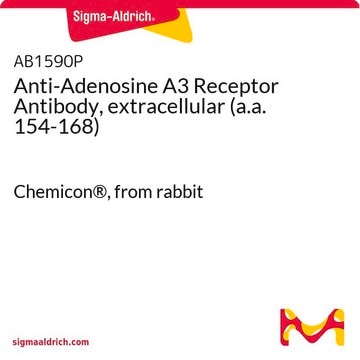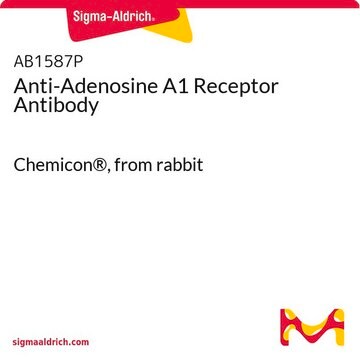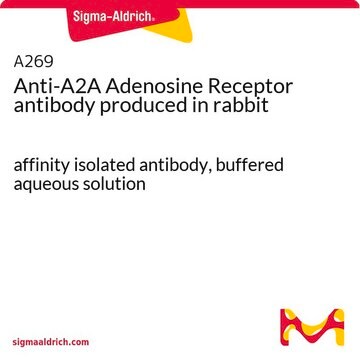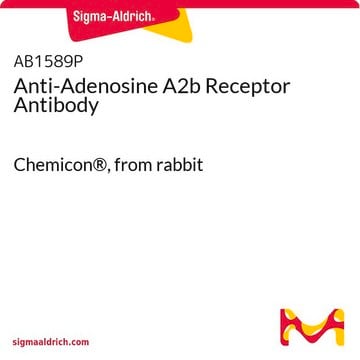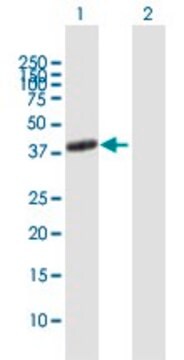AB1559
Anti-Adenosine A2a Receptor Antibody
serum, Chemicon®
Sign Into View Organizational & Contract Pricing
All Photos(1)
About This Item
UNSPSC Code:
12352203
eCl@ss:
32160702
NACRES:
NA.41
clone:
polyclonal
application:
ELISA
WB
WB
species reactivity:
pig, bovine, rat, human, canine
technique(s):
ELISA: suitable
western blot: suitable
western blot: suitable
citations:
5
Recommended Products
biological source
rabbit
Quality Level
antibody form
serum
antibody product type
primary antibodies
clone
polyclonal
species reactivity
pig, bovine, rat, human, canine
manufacturer/tradename
Chemicon®
technique(s)
ELISA: suitable
western blot: suitable
suitability
not suitable for immunohistochemistry
NCBI accession no.
UniProt accession no.
shipped in
dry ice
target post-translational modification
unmodified
Gene Information
human ... ADORA2A(135)
Immunogen
Synthetic 30 amino acid peptide corresponding to amino acids 383-412 of the canine adenosine A2a receptor near the C-terminal intracellular domain (30 amino acids) of the cloned canine A2a receptor. The A2a sequence selected in not present in A1, A2b and A3 receptors.
Application
This Anti-Adenosine A2a Receptor Antibody is validated for use in ELISA, WB for the detection of Adenosine A2a Receptor.
Western blot: 1:1,000-1:5,000 (Chemiluminescence technique), 40-100 μg membrane proteins/lane of striatal membranes. Higher concentrations of the antibody may be necessary if colorimetric detection or milk-based antibody diluent are used.
ELISA: 1:10,000-1:50,000 (50-100 ng A2aR peptide (Cat. Number AG285)/well)
Optimal working dilutions must be determined by end user.
ELISA: 1:10,000-1:50,000 (50-100 ng A2aR peptide (Cat. Number AG285)/well)
Optimal working dilutions must be determined by end user.
Physical form
Rabbit antiserum. Liquid containing 0.1% sodium azide.
Legal Information
CHEMICON is a registered trademark of Merck KGaA, Darmstadt, Germany
Not finding the right product?
Try our Product Selector Tool.
Storage Class Code
10 - Combustible liquids
WGK
WGK 1
Certificates of Analysis (COA)
Search for Certificates of Analysis (COA) by entering the products Lot/Batch Number. Lot and Batch Numbers can be found on a product’s label following the words ‘Lot’ or ‘Batch’.
Already Own This Product?
Find documentation for the products that you have recently purchased in the Document Library.
Kah Y Tan-Allen et al.
Experimental eye research, 80(5), 687-696 (2005-05-03)
Previous studies indicated that adenosine can increase [cAMP](i) and stimulate fluid transport by corneal endothelium. The purpose of this study was to determine which adenosine receptor subtype(s) are expressed and to examine their functional roles in modulating [cAMP](i), [Ca(2+)](i) and
Patrycja Bolewska et al.
Neuroscience journal, 2019, 5950818-5950818 (2019-07-06)
There is an excellent correlation between the age when alcohol consumption begins and the likelihood of lifelong problems with alcohol abuse. Alcohol use often begins in adolescence, a time marked by brain development and maturation of numerous brain systems. Rats
Hendrik Busse et al.
Cardiovascular drugs and therapy, 30(6), 551-558 (2016-10-21)
Mechanical and morphological ischemia and reperfusion (I/R) injury is reduced in septic hearts. The mechanism behind this "cardioprotection" is less well understood. As adenosine receptors play a major role for cardioprotection in non-septic hearts, we investigated the influence of adenosine
Zhiwei Shi et al.
The Journal of neuroscience : the official journal of the Society for Neuroscience, 31(37), 13118-13127 (2011-09-16)
Although retinal bipolar cells represent a morphologically well defined population of retinal interneurons, very little is known about the developmental mechanisms that regulate their processing. Furthermore, the identity of specific bipolar cell types that function in distinct visual circuits remains
Dasiel O Borroto-Escuela et al.
Frontiers in pharmacology, 9, 829-829 (2018-09-15)
The A2A adenosine (A2AR) and D2 dopamine (D2R) receptors form oligomers in the cell membrane and allosteric interactions across the A2AR-D2R heteromer represent a target for development of drugs against central nervous system disorders. However, understanding of the molecular determinants
Our team of scientists has experience in all areas of research including Life Science, Material Science, Chemical Synthesis, Chromatography, Analytical and many others.
Contact Technical Service